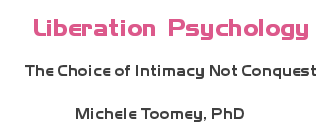Learning Self-Expression with Accountability Takes Discipline, Courage, Commitment... and Brains
© 1999 Michele Toomey, PhD
What is accountability?
It is an honest claiming of what is going on for us underneath the words or actions that we are being confronted about and held accountable for.
It is not: A defensive reaction, a counter-attack, a manipulation, a lie, a withdrawal, or a denial.
Why does it take discipline? Accountability is a face-to-face encounter with the truth and with ourselves. It requires a self-reflection and a claiming, not just a reacting, and that takes discipline. Reactions happen automatically, that is their nature. If not met with discipline they just continue as chain reactions. They ask nothing of us. Even infants can react. Automatic responses are just that, automatic. Accountability is a deliberate, thoughtful response. To be accountable we must be reflective and deliberate. We must conduct an honest search to discover the truth about what was and is going on for us and why. To be accountable we must confront our reactions and discipline ourselves to search and try to discover, understand, and claim what we've said or done, not just react.
Why does it take courage? It takes courage to be accountable because we have to be honest and claim our part in whatever we said or did that we are being confronted about, either by ourselves or by another. When confronted it is a natural tendency to want to duck the truth, either because we don't want to get in trouble, we are embarrassed and don't want to admit what we said or did, or we are angry at getting "caught" and feel trapped so we try to deflect, distract, defend or counter-attack. Accountability leaves us unprotected, exposed, and having to deal with the effects and the consequences of our actions. That takes courage.
Why does it take commitment? Without commitment to fairness and integrity, we will never be accountable. We must value fairness if we are to be fair, and accountability is the fairest thing going. No one is ever in jeopardy when fairness is the governing principle. The same is true of integrity (honesty). If there is fairness, then honesty is not dangerous. It is, instead, a relief. Even though there will be consequences when we are accountable for what we've said or done, the integrity of the process will provide its own protection. The understanding and resolution that follow will bring an intimacy, and a lessening of tension that provide a sense of peace and well-being, as well as a sense of being known and being connected. If we are committed to fairness and honesty, we can find the discipline and courage to be accountable. If we are accountable, the fairness and honesty bring us a sense of peace and connectedness and well-being. It is a rewarding process.
Why does it take brains? Accountability takes brains, because it is not just an automatic process. It is a deliberate one. We have to be self-reflective, ponder what is going on for us, search around in our past, present and anticipated future experiences, and make the appropriate associations and selections of what is relevant to the particular confrontation. Then we need to draw on the discipline and courage it takes to express what we discover with fairness, honesty and accountability. This is a complicated thought process involving strong feelings that could easily just turn into automatic reactions. It takes no particular brain power to react and bully, or react and deny, or react and manipulate and lie. It is easy. Initially it is much easier than being accountable. The problem is after... there is no relief, no peace, no understanding, no resolution... just reactions. Accountability requires sophisticated thought processes, and is both emotionally and intellectually hard. It takes brains. Hopefully, you will learn to enjoy using your brain to be accountable and consider it as exciting as being shrewd, clever and manipulative. Hopefully, your value system will prefer courage, commitment, discipline, integrity and fairness, and the understanding and intimacy that follow.
To Have Accountability We Must Have Confrontation. For self-expression to have accountability, it must first have confrontation. We have first to confront ourselves to discover what's going on for us before we can be accountable to ourselves or to others. A confrontation is a demand for fairness and honesty. It is not an attack, it is an invitation, a strong request, a demand, to look at something that seems unfair and many times abusive. As in accountability, it requires discipline, courage, commitment and brains.
When we are offended, angry, frustrated, hurt, afraid, or the like, it is a natural tendency to lash out or to withdraw. Our first reaction is usually strong, and if we're not disciplined it can easily lead to an attack that's as unfair or abusive as the original behavior.
A confrontation should first be a revealing from the one doing the confronting, claiming that something that was said or done felt unfair. The confronter has to have the courage to go first. The one being confronted needs to be able to listen and not just react, deny or defend. By going back and forth trying to reveal and understand why the situation occurred, a resolution should eventually evolve. New information about yourself and each other should be discovered. A better understanding should occur and that will lead to greater respect and caring for each other.
Think of a confrontation as a strong, straight up and down motion, and an attack as an abusive blow directed at the other person. In a confrontation, no one is attacked or abused, and no one tolerates an attack or abuse. Learning to confront with fairness, integrity, and accountability will, in my opinion, provide you with one of the most valuable and powerful tools of your life. I consider it a privilege to try to help you acquire this powerful tool. |



